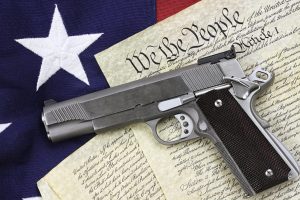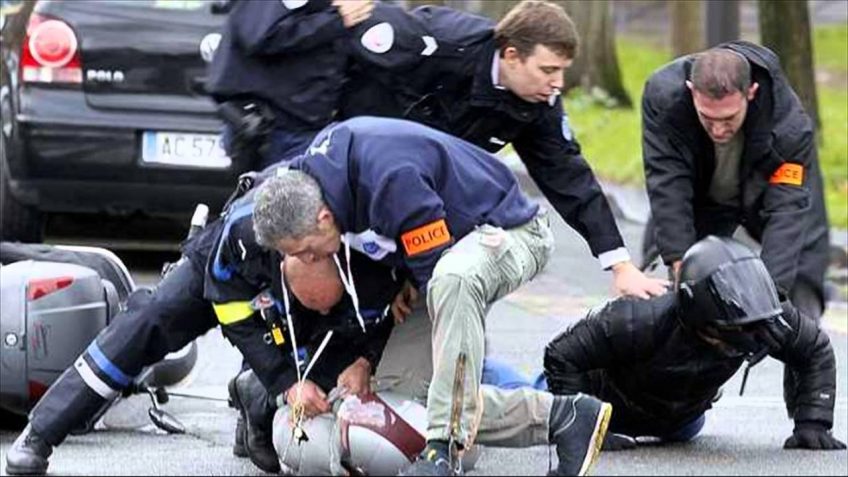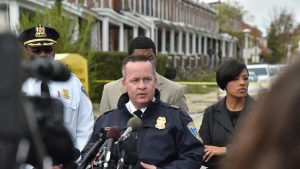
Handgun lying over a copy of the United States constitution and the American flag.
Herein is a proposal for changes in how we protect the American people from the unlawful use of firearms. This proposal upholds the Second Amendment, recognizes that there are responsible gun owners whose actions can and often do promote the public welfare, but which makes it very much more difficult for persons to possess weapons that they are not able to safely carry because of reasons of their training or their temperament. It would result in a system much more like that of Switzerland than of Australia except that the task of certifying responsible gun owners would fall to private corporations, not to a government agency.
To implement this proposal Congress would have to pass enabling legislation that would create the framework which States and local governments would adjust to meet local needs. This legislation would have to meet the approval of the Supreme Court as being consistent with the safeguards of the Second Amendment and the Administration would have to diligently and effectively implement and honor its intentions and restrictions.
Some foundational tenets
On Rights and Responsibilities
One of the largest barriers to sane gun control is the assertion on the part of many Americans that they have a “right to keep and bear arms.” This right is enshrined in the Second Amendment and has been affirmed repeatedly by the Supreme Court. What this assertion fails to observe is that there are different types of rights. Some rights are available for purchase as with mineral rights or water rights. Some rights are universally available as with human rights. But most rights are accessible only by virtue of being responsible. Anyone can drive a car legally as long as they purchase a car, get a license, register the car, and buy insurance. They can have the right if they demonstrate the responsibility.
Maintaining a balance of rights and responsibilities is essential for healthy, stable, and just relationships. We don’t let our children cross the street without holding the hand of an adult until they are responsible for looking both ways. They don’t get to go a friend’s house after school until they are responsible to call when they get there. If we are in relationships where we have lots of responsibilities but few rights we feel oppressed. If we have lots of rights but few responsibilities we feel entitled… and we are oppressing someone.
We have established that the right to bear arms is one that is not available to those who have shown that they are not responsible (felons, domestic violence offenders…) and we have determined that there are certain weapons no private citizen may own (tanks, rockets…). What we have not determined is what must be true before a private citizen may possess a particular firearm. We have only determined what must not be true and even then we aren’t sure how we will know. How does one demonstrate that one is responsible and thus entitled to the right?
An Understanding of “Militia” in the Second Amendment
The wording of the Second Amendment is a bit odd. It reads, “A well regulated Militia, being necessary to the security of a free State, the right of the people to keep and bear Arms, shall not be infringed.”
If I may be permitted to paraphrase the wording without, I believe, altering its meaning but in fact making it clearer we might read it as, “The right of the people to keep and bear Arms shall not be infringed because the security of a free State depends upon a well regulated Militia.”
About this reference to a Militia, the Supreme Court held in DC vs. Heller that, ““The “militia” comprised all males [sic] physically capable of acting in concert for the common defense…” and that the reason for this provision is “…so that the ideal of a citizens’ militia would be preserved.”
A militia is thus an organization that identifies and organizes persons so that they may act in concert for the common defense for the security of a free State. It is not a gang or posse or band of vigilantes.
Polarization, Paralysis, and the Middle Ground on the private possession of firearms
We are routinely horrified by acts of violence against innocents by criminals and crazies. Each new atrocity is met with demands that something be done but we are paralyzed as a nation by the polarization of positions by those who insist that the only way we will all be safe is if everyone carries a gun and those who insist that the only way we will be safe is if no one carries a gun.
The large middle ground however is the understanding that there are some people who should not be permitted to carry a firearm. There are those who have demonstrated criminal intent, poor impulse control, or who are at this point in their lives in such a state of emotional overwhelm that holding such power is more a source of risk than of safety. There is consensus that some people must not possess firearms.
And it is clear that some people may responsibly possess some types of firearms. Indeed, some persons by virtue of their occupation must carry guns. But there are also private individuals who care enough about the culture of firearms to respect guns and to use and care for them in a manner that respects and protects not only themselves but others. There is consensus that some people may possess firearms.
What it means to be a Responsible Gun Owner
I don’t know of a comprehensive list of those things that one does to be a “responsible gun owner.” It would include the use of trigger locks, best practices for storing and carrying firearms, training in the care and use a particular class of weapon, and routine practice to maintain skills and assess response times and strength. While I don’t know what all belongs on the list I am quite confident that there are people who do. And I am quite confident that there are persons who possess firearms who don’t adhere to those practices.
Ownership of Firearms or Possession of Firearms
In our efforts to limit who can have a firearm we have decided to limit who can purchase a gun. We have made this an issue of gun ownership. But it is largely irrelevant who owns the gun. The issue is who holds the gun. The concern is not for ownership but for possession.
Some May and some Must Not possess: who decides
When it comes to private persons in the United States, we have determined that there are some who may possess firearms and some who must not have them. In our efforts to limit who may have firearms we have built those limits at the point of sale. The person who is selling the gun (under certain circumstances) must do certain kinds of background checks to determine if a particular person is someone who is not barred from ownership. This is the fox guarding the hen-house. It is in the dealer’s interest to find that the person is an eligible customer.
While to some it would make sense that it be a function of some aspect of government to make such a determination, one central motivation for the Second Amendment was to protect against over-reach by a government. Thus the protection is for private citizens and there are those who fear that regulation by a governmental entity will not only infringe upon their rights but actually put them at risk. So it will not be acceptable for the government to certify which persons have the right as is done in Switzerland.
So what I am proposing is that this determination of who may possess a firearm and who must not possess a firearm be made by communities of responsible gun owners.
How this might work in practice
I am not someone who has served in elected office. I don’t know the legislative process so there are certainly aspects of how I envision this working that are faulty. But here is a broad outline
Federal legislation
Congress would create legislation to extend a charter to certain types of corporations which entitle them to function as Citizens’ Militia. This charter gives the organization the right to extend to its members the general right to possess a firearm of whatever class they have been certified to possess responsibly. The legislation only needs to assert that such certification is evidence of fulfilling a responsibility such that the right can be claimed by an individual.
Supreme Court
The Court would them have to find that such a limitation was in keeping with the intent of the Second Amendment under the prefatory clause with respect to a well regulated Militia being necessary for the security of a free State.
State Legislatures
Each state will then determine whether the federal legislation is sufficient for the procedures of the state or whether additional regulations are necessary for Citizens’ Militia which choose to operate in that state.
Citizens’ Militia
Once the enabling legislation is in place, existing organizations may apply for a charter or new organizations may form. I imagine that gun clubs and shooting ranges would be interested and I certainly hope the National Rifle Association would choose to participate.
It is my hope that the legislatures don’t over-function and try to regulate the details of how militias operate. Certainly Militias would have to identify that members were who they said they were and would have to know what firearms they possess and be able to affirm that they have the necessary training and permits (in accordance with local law). But it would fall to the militias to determine just what training was necessary, which firearms require which training, how often members need to re-certify, and such. Procedures would need to be in place so that mental health professionals could alert Militias to emotional or mental issues that would make gun possession contraindicated [this may require “duty to warn” regulations]. Courts could similarly notify Militias when an Adult Order of Protection was granted.
Private Owners
Private owners will choose to join Citizens’ Militia so that they can have the right to possess their firearms. Anyone who has in their possession a firearm and is not a member of a legally chartered militia and does not have certification for this class of firearm is committing a crime.
There will most likely be no house to house searches for hidden weapons and there will likely be those who refuse to join a Militia. But those who do not will not be able to make a claim to insurance should the firearm be stolen or destroyed and their heirs will have trouble inheriting the gun. Should their gun be used in the commission of a crime, the owner could face criminal charges even if they were not the perpetrator of the crime.
Gun Dealers
Gun sales would be much simpler. Someone wishing to purchase a gun would have to first of all be a member of a Militia and would have to have certification for the class of firearm he or she wished to purchase. The person making the sale would only have to certify that the buyer had appropriate documentation.
General Populace
Ultimately all of this is worth doing only if it means greater safety for the people of this nation. Some will be quite concerned with the idea of an organization like the National Rifle Association being given a charter to determine who may and must not possess firearms. They will need to be assured that there are safeguards.
No matter who makes the determination about the possession of firearms, at some point someone who has all of the necessary documentation will commit a crime with a firearm. When that happens, the Militia and its members will not be criminally liable. But the Militia will have to show that it used due diligence in making the determination about that person.
Should it be shown to be lacking, the Militia may face civil penalties. A Citizens’ Militia that does not follow best practices in the certification of its members could be sued and could potentially lose its charter. In this way the market will force the Militia to be diligent in the pursuit of its responsibilities.
This will not be very different from protecting against a fire. We can follow all applicable building codes and have working smoke detectors but fires may still start. But if the builder didn’t use a licensed electrician, the builder may be liable.
It is therefore in the interest of the Militia to be very cautious about who is a member and who is certified in a given class of weapon.
In Summary
By creating a well-regulated Militia and giving it the authority to determine who may and may not possess a firearm we elevate the status of its members to that of a “protector of the common good” because making this determination is necessary for the security of a free state. It is for that purpose that the right to keep and bear arms is granted to private persons. To possess a firearm for any other purpose than the common good is criminal and a violation of the safeguards enshrined in the Constitution.








